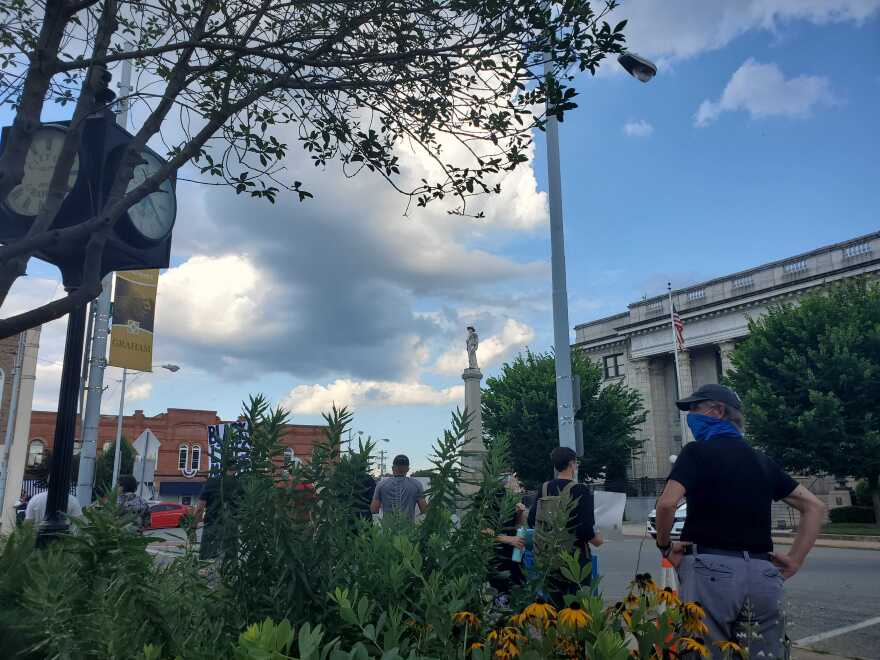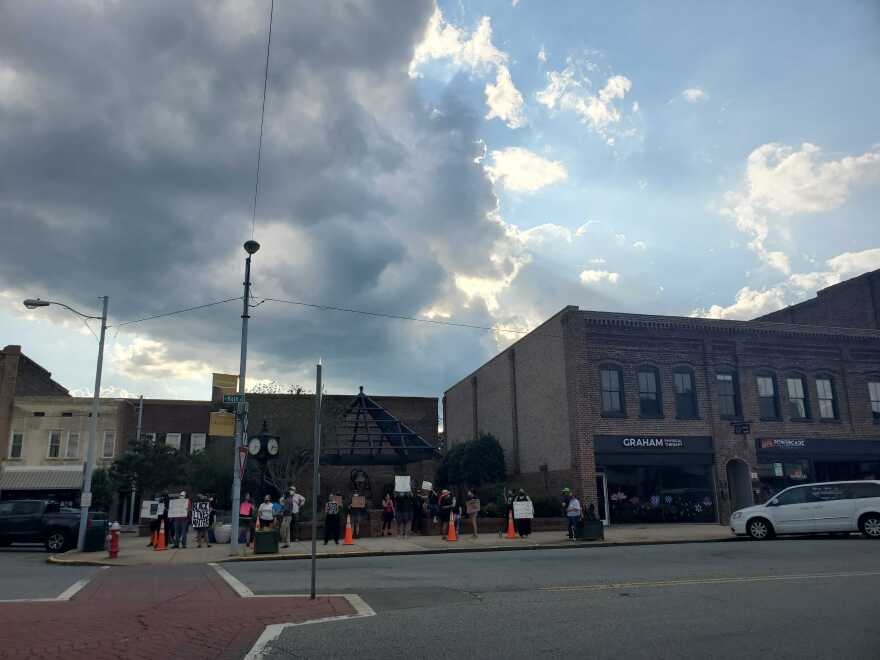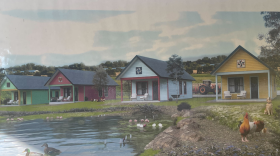On July 1, a warm and muggy evening, a group of about 50 people gathered in downtown Graham to protest police brutality and racism. Most who drove by raised a clenched fist or thumbs up in support. Some flashed a different finger and had a different message.
This group of protesters followed very specific instructions. They stayed only in their designated corner of the small downtown square, located about halfway between Durham and Greensboro. And they stayed behind orange cones that police said were there for their protection.
Gina Cazares organized this protest, and said she didn't feel very protected. More like caged in.
"Living here as a female Mexican, it's always been like I never fit in," said the 21-year-old Cazares who has lived in Graham since she was five. "We were always stared at. And I was just like, why? I'm a human. And it really wasn't until I grew up a little more and realized that this [is] really a bad town. We are very divided, and I really didn't think of that. I always thought we were a very tight-knit community. But it really is not the truth."
Protests and rallies supporting social justice – and against police brutality – have swept through the nation's biggest cities for more than two months. The movement has support in smaller communities, as well. But demonstrators there aren't always finding the same strength in numbers. Now, inspired by demonstrations following the killing of George Floyd, Cazares and others are standing up against what they see as unequal treatment by law enforcement. When they have gathered, some protesters have been told by police to put their signs down, or to disperse. When Confederate sympathizers have previously demonstrated in much larger numbers in Graham, Cazares says such restrictions and directions weren't suggested or enforced.

"A lot of Confederates that would be out here, it really is like, why are they not told to disperse while we had like three people on one corner holding up two signs? When they have the whole court square full of their trucks, their flags, and they're not told to disperse?" she said.
Cazares and others say that Confederate supporters are trying to intimidate them, and that neither the Graham Police nor the Alamance Sheriff have done enough to stop it.
"We're not being treated fairly," said Cazares. "We're not toting around guns in our waists. We're not flying around Confederate or controversial flags. We are literally just standing peacefully dressed in all black, holding our handmade rinky-dink signs. And we just want our voices to be heard, and we are constantly being turned away."
Last month, the Alamance County Sheriff's Office banned demonstrations in the city of Graham. Anyone who didn't have a permit to protest would be arrested. The American Civil Liberties Union, along with other civil rights groups, filed an emergency lawsuit, saying the ban on demonstrations violated the First Amendment. A federal judge granted a temporary restraining order against the ban.
What's happening in Graham has lifelong residents and new transplants concerned and frustrated.
Dionne Lyles says she's the only Black business owner in downtown Graham. Her clothing shop is called The Muse, and sits within sight of the Confederate monument.
"When I come into work, I'm nervous," she said. "My belly is sick. My heart is in my throat. Sometimes I'm trembling. For me to say that I'm not impacted by it would be dishonest. My ego wants me to be like: forget about it, yes I got this all under control, everything is fine and I'm going to stay here. My heart says: I have zero desire to be here."

Lyles says she had her fair share of racial harassment in Alamance County.
"You would almost think you were time traveling because of the behaviors that have arisen since the George Floyd murder. The things that are identified that are associated with the statue, were the people that called two Black people 'niggers' who were trying to have a beer. If this statue draws in that type of person, it keeps us from being as progressive as we think that we are, and that we desire to be."
Lyles is a strong supporter of the Black Lives Matter movement, even in the face of what she says is a lack of support from law enforcement – and other residents – in Graham.
"You can't say that you support my business without supporting Black Lives Matters because I am a Black woman," she said. "The fact that people feel the need to disassociate me with the other is beyond me."
The tense and uneven dynamic between social-justice demonstrators, Confederate sympathizers and law enforcement was captured in a short video taken several weeks ago, just outside Lyles' clothing shop.
We are ok. Thank you to everyone who asked about us & to every anti-racist that came out to Graham tonight to stand together. Black Lives Matter. Here is the video of the incident. First Tony got smacked twice, then while that guy is being arrested another Confederate punched me. https://t.co/yAkVNobeu7 pic.twitter.com/nzY40BU6ho
— megan squire (@MeganSquire0) June 21, 2020
In the video, posted to Twitter by Elon University professor Megan Squire, white counter-protestors push their way through demonstrators and clearly strike Squires and her husband, also an Elon professor. Alamance County Sheriff Terry Johnson is seen motioning for deputies to move in and arrest one of the men. The man refers to the sheriff casually by his first name – like old-time friends − and seems genuinely shocked he is being arrested.
Squire said Sheriff Johnson treats her group differently than the counter-protesters.
"He's very 'ha ha ha' with these Confederate types and most of them are armed. I think he knows that," said Squire. "And that's, by the way, probably one of the reasons why he doesn't want people to quote/unquote protest and have stuff turned into a demonstration because he'll have to go arrest them or tell them to disarm, which they won't do. It's crazy."
Although North Carolina is an open-carry state, there is a law against carrying weapons during a protest. This has led to some careful defining of what does – and more importantly doesn't – constitute a protest.

Neither Sheriff Johnson nor Graham Police replied to WUNC's requests for interviews. Johnson gained notoriety in recent years when the federal Department of Justice – under the Obama Administration – brought a case against him for targeting Latinos during traffic stops in order to deport them. That case was dismissed five years ago.
It just so happens that Squire researches hate groups and online extremism. She says that, despite everything, she's optimistic that the situation in her county will improve.
"I think things will get better, I'm hopeful," said Squire. "I think there's a lot more good people than bad people. I think that some of this is some of them acting not because they feel so diminished in their numbers and in their relevance, I think it's like acting out like a little kid when they're upset. They don't know what else to do and so they're engaging in violence."
Another "March for Justice and Change" is scheduled for Saturday morning in downtown Graham.










